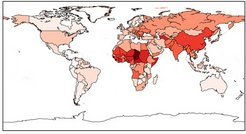Air pollution is one of the world's most dangerous health risks
Researchers calculate that the effects of air pollution shorten the lives of people around the world by an average of almost three years
Polluted air is a public health hazard that cannot be evaded. It is widely known that long-term exposure to air pollution enhances the risks of cardiovascular and respiratory diseases. Scientists from the Max Planck Institute for Chemistry and the University Medical Center Mainz now calculated in a new study that the global, public loss of life expectancy caused by air pollution is higher than many other risk factors such as smoking, infectious diseases or violence.

Air pollution caused 8.8 million premature deaths worldwide in 2015. This corresponds to an average reduction in life expectancy per capita of 2.9 years. In comparison, tobacco smoking reduces the life expectancy by an average of 2.2 years (7.2 million deaths), HIV / AIDS by 0.7 years (1 million deaths), parasitic and vector-borne diseases such as malaria - by 0.6 years (600,000 deaths). “Air pollution exceeds malaria as a cause of premature death by a factor of 19; it exceeds violence by a factor of 17 and HIV / AIDS by a factor of 9. Given the huge impact on public health and the global population, one could say that our results indicate an air pollution pandemic”, said Jos Lelieveld, director at Max Planck Institute for Chemistry and first author of the study.
This study is the first to examine the global impact of air pollution on human health compared to other risk factors worldwide. “Our comparison of different global risk factors shows that ambient air pollution is a leading cause of premature mortality and loss of life expectancy, in particular through cardiovascular diseases”, says Thomas Münzel, director of the Cardiology Center at the University Medical Center in Mainz and co-author of the paper.
Relationship between pollution and disease
The scientists examined the connection between exposure to pollutants and the occurrence of diseases. In order to calculate the worldwide exposure to pollutants, which primarily include fine particles and ozone, the researchers used an atmospheric chemical mode. They then combined the exposure data with the Global Exposure - Mortality Model that derives from many epidemiological cohort studies. Using these tools and data, scientists investigated the effects of different pollution sources, distinguishing between natural (wildfires, aeolian dust) and anthropogenic emissions, including fossil fuel use. Based on their results they could estimate the disease-specific excess mortality and loss of life expectancy in all countries world-wide.
The study results show that the mortality caused by ambient air pollution is highest in East Asia (35 percent) and South Asia (32 percent), followed by Africa (11 percent), Europe (9 percent) and North- and South America (6 percent). Lowest mortality rates are found in Australia (1,5 percent) associated with the strictest air quality standards of all countries. “We understand more and more that fine particles primarily favor vascular damage and thus diseases such as heart attack, stroke, cardiac arrhythmia and heart failure. It is of outmost importance that air pollution is adopted as a cardiovascular risk factor and that it is distinctly mentioned in the ESC/AHA guidelines of prevention, acute and coronary syndromes and heart failure”, continued Münzel.
Avoidable deaths
According to the findings of the study, almost two thirds of the deaths caused by air pollution, namely around 5.5 million a year are avoidable, and the majority of polluted air comes from the use of fossil fuels. The researchers estimate that the average life expectancy world-wide would increase by more than a year if the emissions from the use of fossil fuels were eliminated.
The team from the University Medical Center Mainz and Max Planck Institute for Chemistry published a similar paper last year focusing on the consequences of air pollution in Europe. According to the earlier study, nearly 800,000 Europeans die prematurely every year due to illnesses caused by air pollution. Polluted air shortens the lifespan of Europeans by more than two years.












